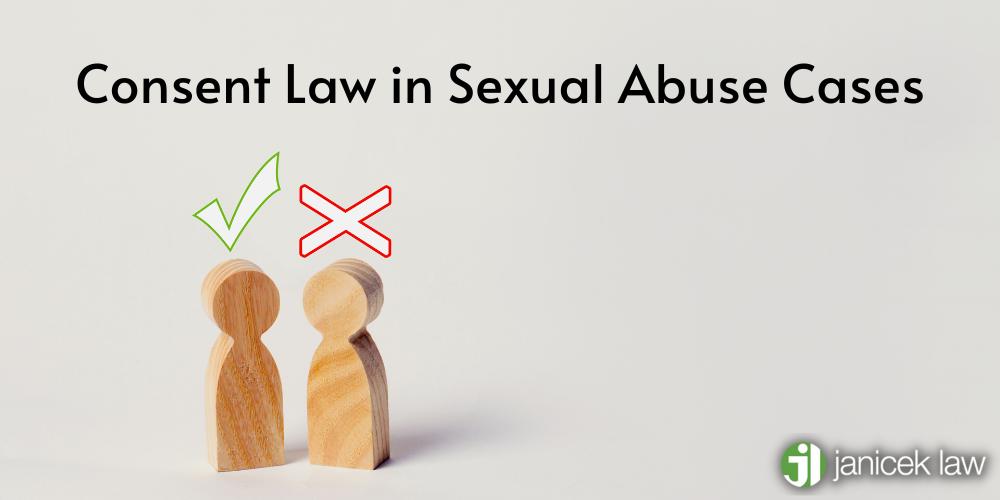Navigating Texas consent laws can be difficult, especially for survivors of sexual assault and other sexual offenses seeking justice. Texas law sets the age of consent to determine when young individuals can legally engage in sexual activity, but violations—such as statutory rape, sexual assault, and sexual misconduct involving visual materials—can lead to severe penalties for sex offenders.
A sexual act is only considered valid when both parties legally consent, but many factors can make a person physically unable to give legal consent, including age difference, mental disease, coercion, or physical force. Survivors of sexual contact involving manipulation, exploitation, or non-consensual sexual relations deserve strong legal representation to protect their legal rights and seek justice.
Whether the sexual conduct involves a minor engaging in a sexual relationship with an older individual, a Texas Romeo and Juliet law dispute, or a reportable conviction for child pornography or sexual assault on a minor, the legal framework surrounding these cases can be complex.
Our San Antonio sexual abuse lawyers provide experienced advocacy for survivors of sex crimes in Texas, helping them navigate the legal system and pursue compensation for their suffering. If you or a loved one has been impacted by sexual exploitation, call 210-366-4949 for a free consultation today.
What is Sexual Consent in Texas?
Sexual consent in Texas refers to a person’s ability to give consent to sexual activity, such as consensual sex under Texas law. The age of consent laws establishes when young individuals can legally engage in a sexual relationship, with the Texas age of consent set at 17 years old. Any sexual act involving a minor under this age may be considered statutory rape, leading to severe legal consequences.
However, there are notable exceptions, such as the Romeo and Juliet law, which allows for consensual sexual relations between individuals close in age. Sexual consent in Texas must also be given voluntarily—if a person is physically unable due to mental disability, intoxication, or coercion, the encounter may be classified as sexual assault or aggravated sexual assault.
Additionally, sexual consent must be clear and ongoing; past consensual sexual activity does not imply future consent. Understanding Texas consent laws is crucial for both protecting survivors and ensuring compliance with the legal framework and criminal procedures surrounding sex crimes under Texas law.

Under What Conditions Is A Person’s Consent for Sexual Activity Not Valid in Texas?
Capacity to consent is possibly the biggest factor that states look at to determine if a partner can legally consent to a sexual encounter, especially within a criminal investigation. Each state looks at a variety of factors to determine someone’s capacity to consent, including:
Violating Age of Consent Laws in Texas
Violating age of consent laws in Texas can result in severe legal consequences, as engaging in sexual activity with someone below the Texas age of consent may be considered statutory rape under Texas law. A sexual act with a minor cannot legally consent due to age difference can lead to sexual assault or aggravated sexual assault charges. Even if the older adult considered this consensual sexual activity or consensual sex, the legal system does not recognize consensual sexual activity with someone under the minimum age as legally permitted. While the Romeo and Juliet law provides exceptions for young individuals close in age, it does not apply to all cases. Those found negligent of violating Texas consent laws could face charges as a sex offender, with a reportable conviction and lifelong consequences. Understanding the critical aspects of the age of consent laws in Texas is essential to avoid criminal and civil liability and ensure that all sexual conduct follows the age of consent laws in Texas.
Can Disabled People Consent in Texas?
Texas consent laws state that individuals with mental diseases or disabilities typically cannot provide legal consent for sexual activities, even if they do not explicitly refuse the sexual conduct. Under Texas law, engaging in a sexual act with a person who lacks the capacity to understand or voluntarily agree to the encounter can result in charges of sexual assault or aggravated sexual assault, the same legal consequences in general, as violating age of consent in Texas. This defines situations where sexual conduct is unlawful due to the individual’s inability to make informed decisions about sexual conduct. If a person intentionally takes advantage of someone with a mental impairment, they may face serious penalties, including being registered as a sex offender. Violating these consent laws can lead to a conviction and a second-degree felony charge. Because cases involving mental disabilities and legal consent can be legally complex, understanding how Texas consent laws and affirmative defense arguments apply is crucial for both survivors and legal professionals handling sexual assault claims.
Can Drunk People Consent Under Texas Law?
Under the Texas penal code, a person who is unable to give consent due to intoxication cannot voluntarily agree to sexual activity. If someone engages in sexual conduct with an intoxicated person who is unable to make informed decisions, it may be classified as sexual assault under Texas law. In cases where the plaintiff’s injury results from intoxication, the accused cannot claim affirmative defense if they knew or should have known that the person was too impaired to legally engage in consensual sex. Violating age of consent in Texas while the victim is intoxicated can result in even harsher consequences, including a potential registration as a sex offender. Because these cases involve complex criminal procedures and require a thorough understanding of consent in Texas, survivors of sexual assault should seek legal support to hold sex offenders accountable.
When a Power Imbalance Exists, Can Consent Be Given in Texas?
For consent in Texas, when a power imbalance exists or if one party has exponentially more professional or life experience than the other, consent may be questioned, as one party may feel pressured or coerced into sexual activity. Texas penal code recognizes that individuals in positions of authority—such as public servants, teachers, employers, or caregivers—may influence a person’s ability to give consent to sexual contact. If a person in power intentionally uses their authority to engage in sexual conduct with someone, it may be classified as sexual assault, even if the victim initially appeared to engage in consensual sex. In cases where the affirmative defense cannot be applied, the offender may face serious consequences. Because these cases often involve complex legal waters, survivors of sexual assault should seek legal representation to determine if the consent given was truly voluntary under consent statutes in Texas.
Elder Sexual Consent Laws in Texas
For Texas consent, elderly individuals have the right to legally consent to sexual activity, but their ability to do so may be questioned in cases involving mental disease, cognitive decline, or a power imbalance with caregivers or authority figures. If an elderly person is unable to provide consent due to conditions such as dementia or Alzheimer’s, engaging in sexual conduct with them may be classified as sexual assault in Texas. Additionally, if a public servant, healthcare provider, or caretaker intentionally takes advantage of an elderly individual, they may face serious consequences. These cases often require a deep understanding of criminal procedure and affirmative defense arguments. Because elder abuse can go unreported, family members and advocates should be aware of consent laws in Texas to protect vulnerable individuals from sexual assault and exploitation.
What is the Age of Consent in Texas?
Age of consent laws in Texas apply to anyone under 17 years old, meaning individuals can consent to sexual activity at age 17 if they have the sexual desire to do so. The way the law defines sexual assault and age of consent, anyone engaging in sexual encounters with a minor under 17 may face charges of statutory rape or sexual assault, especially if there is a significant age difference between the individuals involved.
However, Texas has a Romeo and Juliet law, which provides an affirmative defense in certain cases where both parties are young individuals close in age to avoid unnecessary sex crime charges. Despite these exceptions, violating age of consent statutes can lead to a second-degree felony charge, especially if the minor is manipulated or coerced into sexual conduct.
How Texas Age of Consent Laws Apply to Sex Crimes
In Texas, the age of consent is 17 years old, meaning anyone under this age cannot consent to sexual activity. Engaging in sexual contact with a minor under 17 can lead to statutory rape charges, even if the minor willingly participated. However, Texas recognizes the Romeo and Juliet law, which may provide an affirmative defense to statutory rape if both parties are young individuals close in age.
Texas Romeo and Juliet Law
The Romeo and Juliet law in Texas is designed to protect young individuals from being charged with a sex crime when engaging in consensual sexual activity with someone close to their age. In Texas, the age of consent is 17, but this law provides an affirmative defense for individuals who are at least 14 years old and engage in a sexual relationship with someone no more than three years older. This means that if a 16-year-old has sexual conduct with a 19-year-old, the older individual may avoid statutory rape charges under the Romeo and Juliet law. However, the Romeo and Juliet law does not apply to sex crimes where force, coercion, or mental disability affects the younger party’s ability to consent. Additionally, Romeo and Juliet laws do not prevent all legal action involving young adults.
Homosexual Age of Consent Texas
In Texas, the age of consent for homosexual conduct is the same as for heterosexual relationships, meaning individuals must be at least 17 years old to consent to sexual activity. In Texas, engaging in a sexual relationship with someone under 17—regardless if it’s “homosexual conduct”—can lead to statutory rape charges. While past laws once criminalized homosexual conduct, they are no longer enforceable due to federal rulings. However, the age of consent still applies equally to all relationships.

Legal Consequences for Common Sexual Offenses in Texas
Sentences for sex crimes in Texas vary based on the severity of the offense, the age of the victim, and any aggravating factors.
In Texas, offenses such as sexual assault and statutory rape can result in felony charges, with penalties ranging from two years to life in prison. Aggravated sexual assault, which involves threats, physical force, or a victim who is unable to consent, is a first-degree felony punishable by up to 99 years in prison. Convictions for sex crimes often carry consequences beyond prison time, including mandatory offender registration, probation, fines, and restrictions on housing and employment.
Certain offenses, such as child pornography or repeated sex crimes, can lead to lifetime monitoring. Because Texas imposes strict sentences for sex crimes.
Can You Sue for Sexual Assault in Texas?
Yes, survivors of sexual assault in Texas can file a civil lawsuit to seek compensation for the harm they have suffered. In Texas, victims of unwanted sexual conduct, including sexual assault and sexual contact without consent, may pursue a claim against the perpetrator for medical expenses, emotional trauma, and lost wages.
Unlike criminal procedures that focus on punishment, a personal injury lawsuit allows sexual assault survivors to hold offenders accountable through financial damages. In some cases, third parties—such as employers, schools, or businesses—may also face liability if they failed to prevent the sexual act or ignored convictions of an employee or associate. Survivors must act within the legal landscape of the statute of limitations, which varies depending on factors like the survivor’s age or whether the offense involved a public servant or person in authority. Since suing for sex crimes involves complex legal waters, working with a San Antonio sexual abuse lawyer ensures that victims understand what’s legally permitted and their legal rights to compensation.
Common Sexual Assault Cases in Texas
Clergy and Pastor Sexual Misconduct
In Texas, pastors and clergy members who engage in sexual activity with minors or exploit their authority for sexual desires can face serious punishments, including charges of statutory rape and age of consent violations. Survivors of clergy sexual abuse have the right to seek justice through both criminal sex crimes prosecution and civil lawsuits, holding offenders accountable under the legal landscape of Texas. Because religious leaders hold positions of trust, they may face the same legal consequences as other offenders, even if the victim initially consented. A pastor and clergy sexual abuse lawyer in San Antonio can help survivors understand their legal rights, pursue compensation, and provide strong legal representation in their fight for justice.
Boyscouts Sexually Exploited by Leaders
Survivors of Boy Scouts sexual abuse in Texas have come forward with allegations of sexual assaults by leaders, often involving statutory rape and age of consent violations. These cases involve minors engaging in sexual activity due to coercion, grooming, or manipulation by trusted authority figures. Holding perpetrators accountable for these sex crimes requires navigating complex legal waters, as both individual abusers and the organization itself may bear liability. A San Antonio Boy Scouts sexual assault lawyer can help survivors seek justice, file civil claims, and ensure those responsible are held accountable.
Sexual Assault by Medical Professionals
Sexual assault by medical professionals in Texas is a serious sex crime that violates patient trust and can have lasting physical and emotional consequences. While patients may consent to treatment, consensual sex does not apply when a doctor, nurse, or healthcare provider abuses their position of authority. The legal landscape allows survivors to pursue both criminal charges and civil lawsuits to hold offenders accountable. A San Antonio medical sexual abuse lawyer can provide strong legal representation, ensuring survivors understand their legal rights and fight for justice against those who exploit vulnerable patients.
Sexual Assault by Therapists and Counselors
Sexual assault by therapists and counselors in Texas is a serious violation of trust, as these professionals are in positions of power over vulnerable individuals. Even if a patient initially consents to sexual activity, consensual sex does not apply when a therapist manipulates or exploits their authority. This is a critical aspect of the law, as victims may be unable to make informed decisions due to emotional dependence or professional influence. These sex crimes can result in severe consequences, including criminal charges and civil lawsuits. A San Antonio therapist sexual abuse lawyer can help survivors hold offenders accountable and seek justice for the harm they have suffered.
Nursing Home Sexual Assault
Nursing home sexual assault in Texas is a tragic and often underreported form of abuse, where vulnerable residents may be subjected to sexual activity through physical force, coercion, or manipulation. Many elderly individuals, especially those with cognitive impairments, cannot provide consensual sex, making these cases serious sex crimes in Texas. Pursuing justice requires a deep understanding of both elder abuse laws and the rights of victims. A San Antonio nursing home sexual assault lawyer can help survivors and their families hold abusers accountable and seek compensation for the harm caused.
Child Sexual Assault
Child sexual assault in Texas is a serious sex crime that involves sexual activity with a minor, often through coercion, physical force, or manipulation. Statutory rape and age of consent violations occur when an adult engages in a sexual encounter with a minor, even if the individuals are close or are the same age. In some cases, offenders exploit children through child pornography, distributing visual material of abuse through electronic means. Recognizing the signs of childhood sexual abuse, such as behavioral changes, fear of certain individuals, or knowledge of inappropriate topics, is crucial in protecting victims.
Statute of Limitations Sexual Assault Texas
There is no Texas sexual abuse statute of limitations for criminal charges related to sexual assault, meaning offenders can be prosecuted at any time.
However, for civil lawsuits, survivors of child sex crimes generally have until age 48 to file a claim, while adults typically have up to five years after the sexual assault to seek damages. Because the laws surrounding the statute of limitations can be complex, sexual assault survivors should consult an attorney to understand their legal rights.

San Antonio Sexual Abuse Lawyers
We understand how complex and emotionally distressing sexual abuse cases are, so our top priority will be supporting you and protecting your rights throughout the entire legal process. Call 210-366-4949 to schedule a free consultation at Janicek Law today.

